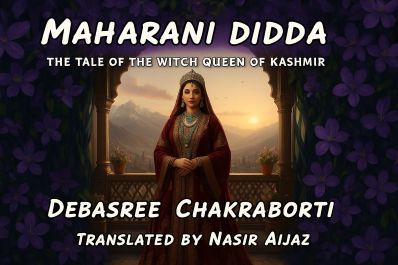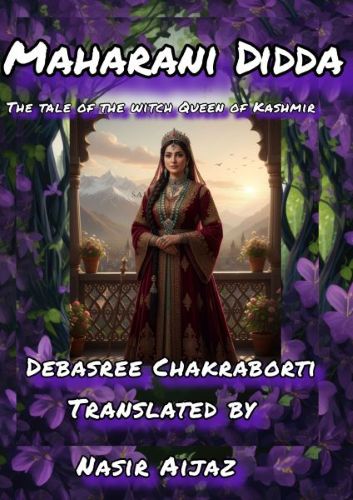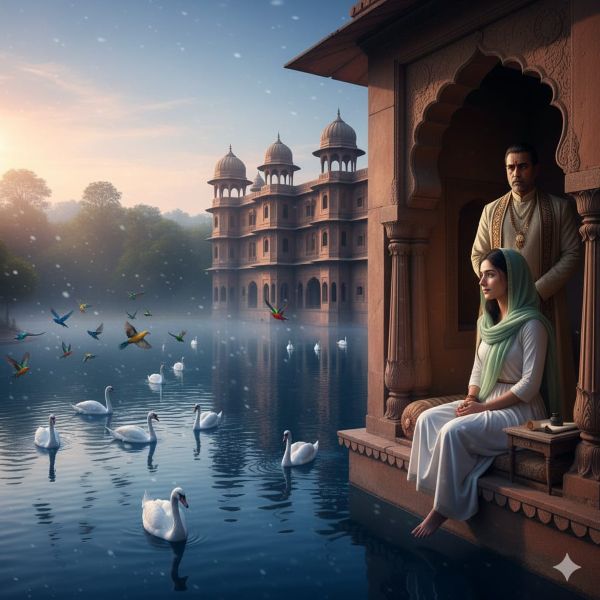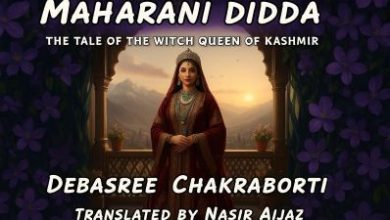Maharani Didda: Witch Queen of Kashmir-5

“The queen’s palace of Kashmir awaits you. Prepare yourself mentally to become the wife of Maharaja Kshemagupta. Auspicious things should be done swiftly—your wedding will take place on the upcoming full-moon night.”
Maharani Didda: Witch Queen of Kashmir
By Debasree Chakraborti
 The palace to the right of Maharaja Kshemagupta’s palace is held under the authority of Prime Minister Phalguna. In front of that palace lies a natural blue reservoir.
The palace to the right of Maharaja Kshemagupta’s palace is held under the authority of Prime Minister Phalguna. In front of that palace lies a natural blue reservoir.
White swans play in the waters of this reservoir, and flocks of birds of various colours swoop down to hunt fish in its waters. On another side of the reservoir lies a forest, and these birds live in the trees of that forest. Sitting by the window of her chamber, Chandalekha watches the birds playing on the blue water. Dressed in white with a green veil tied over her head, she gazes in that direction with full attention. Since childhood, Chandalekha has loved being alone; she has never liked too many people around her. She enjoys sitting silently in a secluded environment, observing the beauty of nature, and then putting her inner feelings into poetry. In fact, when she was only four, her mother passed away after a mere three days of fever.
Since then, her father has raised her like a tender sapling close to his heart. To her father, Phalguna, his daughter Chandalekha is like a little fledgling—he fears the outside world might harm her. So he ensured everything she needed for her education and upbringing within the palace walls. Except for a few chosen people, no one has ever truly seen Chandalekha. To the citizens of the kingdom and to Maharaja Kshemagupta, Chandalekha is a mysterious figure, someone whom none can ever really know. Therefore…Maharaja Kshemagupta agreed without hesitation to marry Chandalekha. After all, people are always more attracted to anything or anyone mysterious.
In the present situation, Chandalekha’s state is much like the birds of that reservoir: they physically merge with nature and savour its essence, and Chandalekha’s mind too remains immersed in nature all day long.
But a terrible twist of fate awaited her—one that would lead her to be sacrificed for the benefit of the person closest to her. It was only a matter of time.
Today, the proposal he had brought for his daughter was, in one word, more terrifying than death. Death comes in a moment, and then everything becomes silent—no more pain. But he, a father, had come to push his daughter toward a dreadful future. Yet Chandalekha would become the Maharani of Kashmir, and then Phalguna would hold all powers in his hands. Later, when a prince was born, Chandalekha’s name would be inscribed in history in golden letters. Phalguna would guide and control the young prince with his own wisdom and judgment. Then all that would be left was to remove Kshemagupta through some secret assassin.
Just then, her father Phalguna entered. As Chandalekha’s mind was absorbed in nature, she did not immediately sense his presence. Phalguna too observed his daughter quietly for a long time; for until now, he had been the one controlling every aspect of her life. Her life had unfolded exactly as he had wished. But today, the proposal he had brought for his daughter was, in one word, more terrifying than death. Death comes in a moment, and then everything becomes silent—no more pain. But he, a father, had come to push his daughter toward a dreadful future.
 Yet Chandalekha would become the Maharani of Kashmir, and then Phalguna would hold all powers in his hands. Later, when a prince was born, Chandalekha’s name would be inscribed in history in golden letters. Phalguna would guide and control the young prince with his own wisdom and judgment. Then all that would be left was to remove Kshemagupta through some secret assassin.
Yet Chandalekha would become the Maharani of Kashmir, and then Phalguna would hold all powers in his hands. Later, when a prince was born, Chandalekha’s name would be inscribed in history in golden letters. Phalguna would guide and control the young prince with his own wisdom and judgment. Then all that would be left was to remove Kshemagupta through some secret assassin.
Chandalekha only had to endure a few years of suffering—one must go through hardship to achieve something great. Steeling his mind, Phalguna addressed his daughter:
“Chandra, at this moment of seasonal change, standing at an open window like this is not proper. Snowfall is expected to begin any day now. The northern winds are extremely fierce. Come inside, my child.”
Chandalekha took one last thoughtful look at the reservoir and then… Like an obedient daughter, she went inside the palace and sat on a wooden seat in another chamber. As soon as her father Phalguna sat beside her, Chandalekha clasped his hand tightly and rested her head on his shoulder.
When Phalguna kissed his daughter on the forehead, a sweet fragrance reached his nose. This scent was to him equal to heavenly bliss—it ignited the deepest tenderness he felt for his beloved daughter, Chandalekha. Tears welled up in Phalguna’s eyes. However much he tried to control his emotions, in front of his child, even someone as cunning and calculating as Phalguna often found it difficult. He remained silent for a while. Then, steadying his mind, he said:
“Chandra, every father has certain dreams about his daughter’s marriage. I too have imagined things about your married life.”
Though Chandalekha lived a confined life in the inner palace, she was highly educated. Through Kashmir’s renowned scholars, her father had shaped her into an erudite woman. But this gentle and dignified Kashmiri maiden was exceedingly imaginative; her depth of knowledge had turned her into someone who dwelled partly in a world of fantasy. Hearing her father speak of her marriage, she straightened up and looked directly into his eyes. Her gaze seemed to search for an unknown world hidden behind his words.
Avoiding her eyes, Phalguna placed his right hand on her head and said:
“Chandra, since the day you were born, my sole purpose in life has been to mold you into a worthy and complete queen. I have fulfilled my duty. Now it is your duty to protect your father’s honor.”
Chandalekha whispered softly, full of astonishment, “Queen!”
Phalguna looked directly at her and said, “Yes—Queen.”
His eyes gleamed. Grasping both of Chandalekha’s hands, he stood up and leaned over her, saying:
 “The queen’s palace of Kashmir awaits you. Prepare yourself mentally to become the wife of Maharaja Kshemagupta. Auspicious things should be done swiftly—your wedding will take place on the upcoming full-moon night.”
“The queen’s palace of Kashmir awaits you. Prepare yourself mentally to become the wife of Maharaja Kshemagupta. Auspicious things should be done swiftly—your wedding will take place on the upcoming full-moon night.”
Having finished speaking, he released Chandalekha’s hands, turned around, and walked out of the palace chamber… …and left the room. Chandalekha was no longer in any state to speak or even to grasp what had just happened. This Kashmiri maiden had always wandered only in the world of knowledge—studying ancient manuscripts, composing poetry, and gazing out from the open window of her chamber. That space had been her entire universe. Beyond it, she had never felt the slightest interest in the people of the present world. Therefore, she had never wished to know anything about the present Maharaja of Kashmir, nor had she ever tried. She had always obeyed her father’s commands like an dutiful daughter. This time, too, she did the same.
This intensely imaginative girl now began weaving colourful dreams about her future husband, Kshemagupta. The story of King Dushyanta from Kalidasa’s Abhijnanasakuntalam came to her mind. She took out the manuscript of Abhijnanasakuntalam from a niche in the wall and began reading the verse describing the first meeting between Dushyanta and Shakuntala:
“Dushyanta’s mind accepted Shakuntala as a wife,
Yet Shakuntala lacked the eligibility to be wed to King Dushyanta.
But the king’s heart was pure and noble, therefore Shakuntala became worthy of marriage.
In matters of righteousness, only purity of mind matters.
Whatever the minds of the virtuous accept becomes justified.”
Chandalekha now began imagining herself as Shakuntala and King Kshemagupta as Dushyanta. She wondered whether the king’s feelings upon first seeing her would be like those of Dushyanta.
To survive in her world of solitude and loneliness, she found new nourishment for her imagination. Inspired by Kalidasa, she soon began to think of herself as the Yaksha from Meghaduta. She imagined the palace as the Ramagiri Mountains and sent the clouds as messengers to her beloved Kshemagupta. All day long, in her mind, she recited the verses of Meghaduta:
“Standing somehow before her,
the repository of all delight,
with tears long restrained deep within,
O king of kings, he bows.
Even the happy become troubled
when the cloud-dark sky reminds them
of beloved arms once clasped around the neck—
what then of those separated by distance?”
Thus, accompanied by the clouds of her imagination, Chandalekha moved steadily toward the auspicious date of her wedding. (Continues)
Click here for Part-1, Part-2, Part-3, Part-4,
___________________
 Debasree Chakraborti is a renowned novel writer of Bengali language. Based in Kolkata, West Bengal, India, she has done Master’s in Modern History from the Kolkata University, and authored some thirty books, mostly the novels, with historical perspective and themes. Her novel is ‘Maharaja Dahir’ that covers the history of Sindh from 662, the year of first attack on Sindh by the Arab armies till date, was published last year and translated by Nasir Aijaz into Sindhi language.
Debasree Chakraborti is a renowned novel writer of Bengali language. Based in Kolkata, West Bengal, India, she has done Master’s in Modern History from the Kolkata University, and authored some thirty books, mostly the novels, with historical perspective and themes. Her novel is ‘Maharaja Dahir’ that covers the history of Sindh from 662, the year of first attack on Sindh by the Arab armies till date, was published last year and translated by Nasir Aijaz into Sindhi language.




